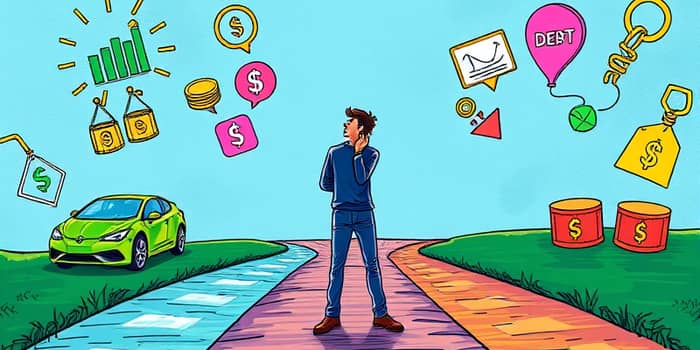When we consider buying a high-ticket item, it often feels exciting to focus on instant gratification and visible rewards. Yet every major expense carries hidden costs beyond the sticker price.
By thinking of big purchases as long-term decisions, we reveal what we truly gain—and what we give up—over years or decades. This approach can transform our financial health and mindset.
Understanding Tradeoffs and Opportunity Cost
Tradeoffs shape our financial future: when you spend money on one thing, you forgo alternatives. Opportunity cost, a core economic principle, quantifies the value of the next best use of those funds.
For instance, allocating $40,000 to a new car means you cannot invest that amount in a retirement account or emergency fund. The real cost includes both the purchase price and the value you sacrifice elsewhere.
Framing and Reframing Your Perspective
How we frame a choice influences our decisions. If you view a home renovation solely as an upgrade, you may overlook the long-term impact on your savings. Reframing encourages stepping back to ask, “What am I not getting if I make this purchase?”
By shifting focus from immediate benefits to future consequences, you can see a luxury vacation not just as a memorable experience but as a potential source of debt and reduced financial flexibility.
Recognizing present bias towards immediate gratification helps you pause and weigh whether a short-lived thrill aligns with your long-term aspirations.
Types of Tradeoffs in Major Purchases
Every substantial purchase involves multiple tradeoff dimensions. Common areas include:
- Savings versus Spending: Money spent today cannot grow through compounding interest.
- Debt versus Financial Freedom: Financing large expenses affects future cash flow and choice.
- Quality versus Affordability: Cheaper items may incur higher long-term maintenance or replacement costs.
- Lifestyle versus Commitment: Buying a home ties you to a location and ongoing expenses.
Practical Strategies to Reframe Your Decisions
To see purchases clearly as tradeoffs, follow these steps:
- Calculate the total lifetime cost of ownership, including interest, insurance, and maintenance.
- Project long-term investment growth potential by estimating returns if the same funds were invested.
- Align spending with core personal and family values, ensuring purchases support your broader goals.
- Consider alternatives like renting, buying used, or delaying to save more.
- Implement a waiting period to pause and reflect before purchasing, reducing impulsive decisions.
Real-World Examples with Numbers
Concrete figures bring opportunity cost to life:
• A $40,000 vehicle financed at 6% over five years incurs more than $12,700 in lost investment returns if those funds were invested instead.
• Buying a $400,000 home with a 30-year mortgage can add $150,000–$200,000 in interest, whereas the equivalent monthly payment invested might grow substantially.
• Spending $5,000 on a vacation today could cost over $1,700 in forgone returns over five years, and may also increase credit card interest if financed.
Aligning Purchases with Your Values
Beyond numbers, emotional and ethical factors matter. A purchase aligned with your life mission can enhance satisfaction, while misaligned spending may cause regret.
Ask yourself: Does this expense support my career growth, family time, or personal development? This mindset transforms buying into a deliberate act of self-expression.
Putting Tradeoff Thinking into Practice
Start by applying these principles to your next major decision. Use spreadsheets or budgeting apps to compare scenarios, and discuss the choice with a trusted friend or advisor.
By fostering making informed, value-driven decisions, you build financial resilience and freedom. Over time, this approach compounds into long-term financial freedom and flexibility.
Ultimately, reframing large purchases as long-term tradeoffs empowers you to take control of your financial destiny, ensuring each decision aligns with your vision for the future.
References
- https://www.1000minds.com/articles/what-are-trade-offs
- https://au.indeed.com/career-advice/career-development/trade-offs
- https://www.soundfinancialtherapy.com/blog/having-fun-with-financial-trade-offs-5-common-trade-off-types
- https://facet.com/financial-wellness/how-to-make-smart-money-trade-offs-and-prioritize/
- https://study.com/academy/lesson/trade-offs-in-economics-definition-examples.html
- https://www.beyondintractability.org/essay/framing
- https://helpfulprofessor.com/trade-off-examples/










